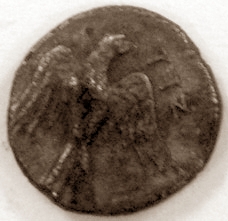Gerah on:
[Wikipedia]
[Google]
[Amazon]
 A gerah () is an ancient Hebrew unit of
A gerah () is an ancient Hebrew unit of
 A gerah () is an ancient Hebrew unit of
A gerah () is an ancient Hebrew unit of weight
In science and engineering, the weight of an object is a quantity associated with the gravitational force exerted on the object by other objects in its environment, although there is some variation and debate as to the exact definition.
Some sta ...
and currency
A currency is a standardization of money in any form, in use or circulation as a medium of exchange, for example banknotes and coins. A more general definition is that a currency is a ''system of money'' in common use within a specific envi ...
, which, according to the Torah
The Torah ( , "Instruction", "Teaching" or "Law") is the compilation of the first five books of the Hebrew Bible, namely the books of Genesis, Exodus, Leviticus, Numbers and Deuteronomy. The Torah is also known as the Pentateuch () ...
(''Exodus'' 30:13, ''Leviticus'' 27:25, ''Numbers'' 3:47, 18:16), was equivalent to of a standard "sacred" shekel
A shekel or sheqel (; , , plural , ) is an ancient Mesopotamian coin, usually of silver. A shekel was first a unit of weight—very roughly 11 grams (0.35 ozt)—and became currency in ancient Tyre, Carthage and Hasmonean Judea.
Name
The wo ...
.
A gerah is known in Aramaic
Aramaic (; ) is a Northwest Semitic language that originated in the ancient region of Syria and quickly spread to Mesopotamia, the southern Levant, Sinai, southeastern Anatolia, and Eastern Arabia, where it has been continually written a ...
, and usually in Rabbinic literature, as a ''ma'ah'' (מעה; Mishnah
The Mishnah or the Mishna (; , from the verb ''šānā'', "to study and review", also "secondary") is the first written collection of the Jewish oral traditions that are known as the Oral Torah. Having been collected in the 3rd century CE, it is ...
Hebrew ''pl''. ma'ot "מעות" which means "coins"). It was originally a fifth of a denarius
The ''denarius'' (; : ''dēnāriī'', ) was the standard Ancient Rome, Roman silver coin from its introduction in the Second Punic War to the reign of Gordian III (AD 238–244), when it was gradually replaced by the ''antoninianus''. It cont ...
or zuz, as seen in the Torah and in Ezekiel
Ezekiel, also spelled Ezechiel (; ; ), was an Israelite priest. The Book of Ezekiel, relating his visions and acts, is named after him.
The Abrahamic religions acknowledge Ezekiel as a prophet. According to the narrative, Ezekiel prophesied ...
(45:12), then became a sixth of a dinar/zuz, such as the coinage of Persian-era Yehud Yehud may refer to:
* Yehud, the Levantine province of the Neo-Babylonian Empire
* Yehud Medinata, the Levantine province of the Achaemenid Persian Empire
* Yehud, the modern-day Israeli city
See also
*Yahud (disambiguation)
*Yehudi (disambiguatio ...
, which came in two denominations: approximately 0.58 gram for the ''ma'ah'' and approximately .29 gram for the half ''ma'ah'' (''chatzi ma'ah''). .58 × 6 = 3.48 grams, which is about the weight of a zuz/denarius based on a 14 gram shekel
A shekel or sheqel (; , , plural , ) is an ancient Mesopotamian coin, usually of silver. A shekel was first a unit of weight—very roughly 11 grams (0.35 ozt)—and became currency in ancient Tyre, Carthage and Hasmonean Judea.
Name
The wo ...
.
The Mishnah
The Mishnah or the Mishna (; , from the verb ''šānā'', "to study and review", also "secondary") is the first written collection of the Jewish oral traditions that are known as the Oral Torah. Having been collected in the 3rd century CE, it is ...
(1:1) and Jerusalem Talmud
The Jerusalem Talmud (, often for short) or Palestinian Talmud, also known as the Talmud of the Land of Israel, is a collection of rabbinic notes on the second-century Jewish oral tradition known as the Mishnah. Naming this version of the Talm ...
(1:4) in Shekalim discuss whether the ''kalbon'' ( agio) which was sometimes required to be added to the half shekel annually levied for the Temple
A temple (from the Latin ) is a place of worship, a building used for spiritual rituals and activities such as prayer and sacrifice. By convention, the specially built places of worship of some religions are commonly called "temples" in Engli ...
, was a ''"ma'ah"'' or a ''"chatzi ma'ah"'' (half ma'ah).
See also
*Biblical and Talmudic units of measurement
Biblical and Talmudic units of measurement were used primarily by ancient Israelites and appear frequently within the Hebrew Bible as well as in later rabbinic writings, such as the Mishnah and Talmud. These units of measurement continue to be used ...
* List of historical currencies
* Yehud coinage
* Zuz
* Shekel
A shekel or sheqel (; , , plural , ) is an ancient Mesopotamian coin, usually of silver. A shekel was first a unit of weight—very roughly 11 grams (0.35 ozt)—and became currency in ancient Tyre, Carthage and Hasmonean Judea.
Name
The wo ...
References
* Exodus 30:13 *Book of Leviticus
The Book of Leviticus (, from , ; , , 'And He called'; ) is the third book of the Torah (the Pentateuch) and of the Old Testament, also known as the Third Book of Moses. Many hypotheses presented by scholars as to its origins agree that it de ...
27:25
* Book of Numbers
The Book of Numbers (from Biblical Greek, Greek Ἀριθμοί, ''Arithmoi'', , ''Bəmīḏbar'', ; ) is the fourth book of the Hebrew Bible and the fourth of five books of the Jewish Torah. The book has a long and complex history; its final f ...
3:47
Talmud
{{MEast-hist-stub